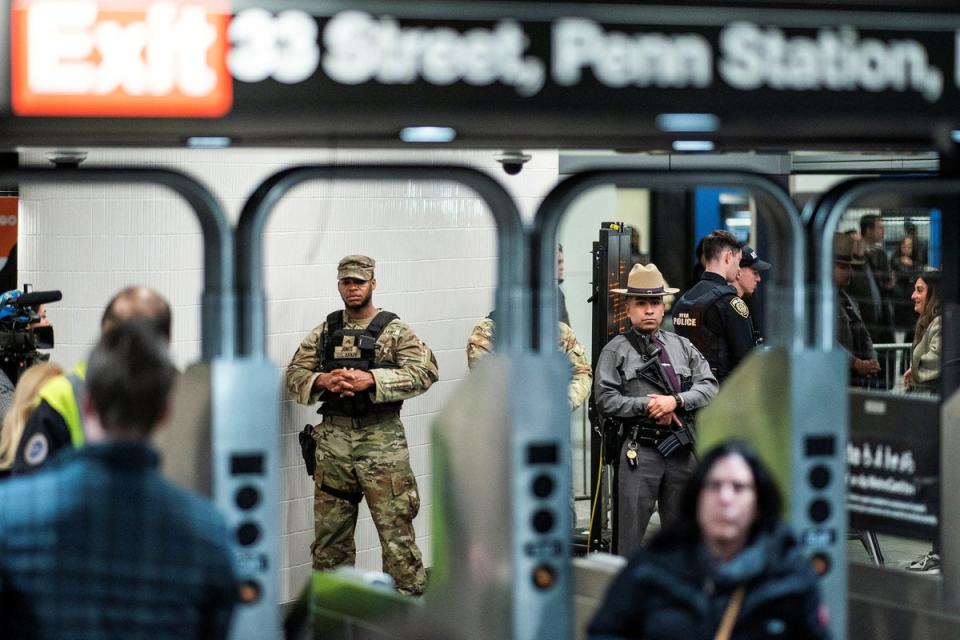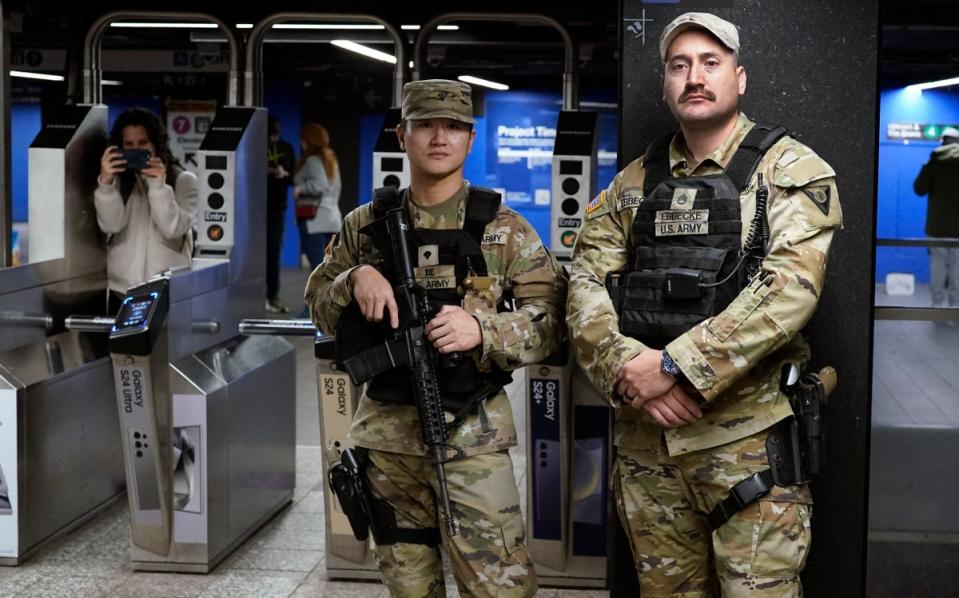Civil rights groups slam New York’s ‘militarized’ subways: ‘Overreaction and overreach’
Heavily armed US Army National Guard troops in camouflage strode the concourse at New York City’s Penn Station, a vast terminal typically filled with American commuters who are now under surveillance from their own military.
The deployment of US troops and state police throughout the city’s extensive subway system this week was immediately met with outrage, fear and scepticism from riders, elected officials, civil rights groups and even police, who rejected the idea that the city is a “war zone” that needs the American military patrolling it.
On Wednesday, New York’s Democratic Governor Kathy Hochul announced that 1,000 National Guard troops, state police and transit officers would begin patrolling the city’s subway stations, checking bags at random and staging a massive show of force that places heavily armed uniformed service members at highly trafficked entrances.
Riders can refuse bag checks, but National Guard troops and police officers can deny them entry. Those riders can “go home,” Ms Hochul told Fox 5 New York on Thursday. “We’re not going to search you. You can say no. But you’re not taking the subway.”
Critics have suggested the changes have more to do with politics than with public safety, with Democratic lawmakers buckling under pressure from Republican officials and right-wing policymakers in election-year campaigns against their “soft on crime” rivals.
Her plan “sounds like something straight out of the mind” of Texas Governor Greg Abbott, according to Albert Fox Cahn, director of the New York-based Surveillance Technology Oversight Project.
“The governor continues to put PR ahead of public safety, wasting taxpayer dollars on these sorts of stunts,” he said. “We shouldn’t militarize the MTA when crime rates are falling and budgets are contracting. This is a tragedy in the making, and I fear how many New Yorkers will be wrongly arrested or hurt before we recognize that soldiers have no place on the streets of democracy.”
Ms Hochul told MSNBC on Thursday that she wants to demonstrate that Democrats “fight crime as well.”
“This narrative that Republicans have said and hijacked the story that we’re soft on crime, that we defund the police. No,” she said.

More than 3 million people rely on New York City’s subway daily. Major crimes in the city’s transit system have increased by roughly 13 per cent so far this year compared to last year, but they’re largely consistent with crime levels before the Covid-19 pandemic, according to data through March.
Ridership has increased since the onset of the pandemic, though transit crime has decreased by 12 per cent within the last several weeks, largely due to more local cops through an earlier plan under Mayor Eric Adams, according to New York City Police Department Chief of Patrol John Chell, who blasted the governor’s measure.
“Our transit system is not a ‘war’ zone!” Mr Chell wrote on X. “Bag checks have been around since 2005???”
The governor’s plan adds 750 members of the New York National Guard and 250 New York State Police and Metropolitan Transportation Authority personnel across the network.
National Guard members will be more prominent at major transit hubs like Grand Central and Penn Station.
The deployment of even more law enforcement and US military follows the mayor’s February plans to boost subways with 1,000 police officers after a spike in major crimes in January. An increase in grand larcenies – thefts – largely drove that spike, according to police.
New York City public advocate Jumaane Willians, whose elected position is first in line to succeed the mayor, said the repeated surge of law enforcement into the city’s subways is “unsustainable.”
“Militarizing the subway with the National Guard and suggesting a wholesale ban on individuals from accessing public transportation are dangerous misuses of resources which could be better spent addressing these issues at their root,” he said in a statement.
“It’s one thing to have conductors announce increased police presence on the platform. It’s another entirely to further criminalize the public on public transit while neglecting the real improvements these resources could be devoted to, like fixing the subway itself,” he said.

New York Civil Liberties Union director Donna Lieberman called the plan “policymaking through overreaction and overreach,” an acceleration of the “stop-and-frisk” agenda that brought a wave of lawsuits and reports of widespread racial discrimination under former Mayor Michael Bloomberg.
“A sweeping surveillance state and biased broken windows policing won’t deliver security,” said Ms Lieberman, referring to the widely derided policing strategy popularised by former Mayor Rudy Giuliani.
Communities United for Police Reform, a solution of more than 200 groups across the state targeting discriminatory policing, said the governor’s plan will put “New Yorkers in harm’s way” and potentially “exacerbate” racial profiling and abuse.
“Rather than investing in necessary public safety infrastructure, like mental health services, affordable housing, and health care, the governor is condoning harassment, racial profiling and abuse of New Yorkers by increasing police presence and expanding police authority in our subways,” according to the coalition’s spokesperson Ileana Méndez-Peñate.


